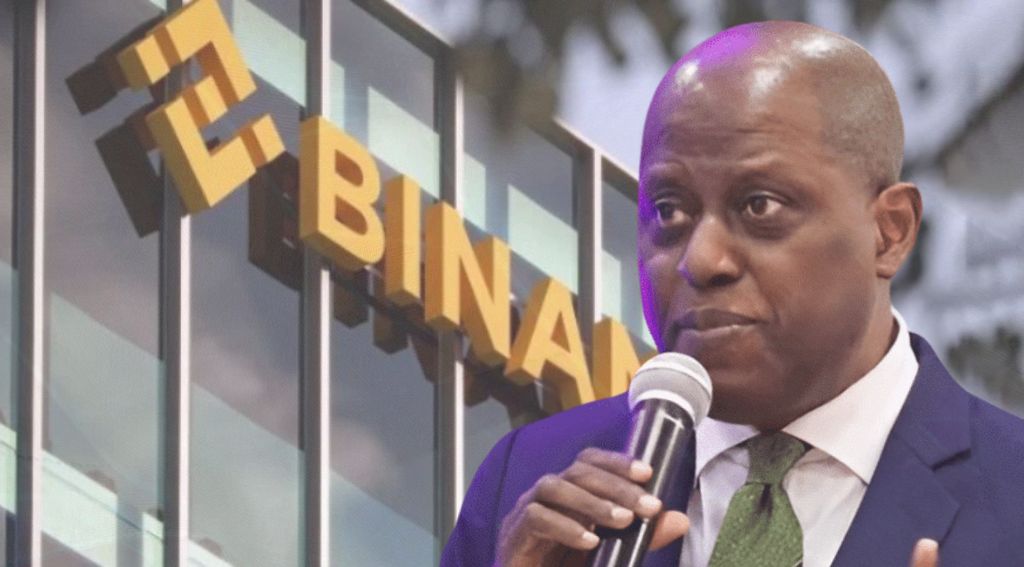Binance faces $10 billion penalty from Nigeria for forex manipulation claims

The Nigerian government has demanded nearly $10 billion in compensation from Binance, the leading cryptocurrency firm. The government alleges that Binance manipulated foreign exchange rates through currency speculation and rate-fixing, leading to a nearly 70 percent devaluation of the naira in recent months.
Two executives from Binance were arrested earlier this week in Nigeria. However, Binance has yet to respond to these allegations. Nigeria, being Africa’s largest economy, is also one of the world’s biggest markets for cryptocurrency.
The Central Bank Governor of Nigeria, Olayemi Cardoso, (picutred above), stated that Binance Nigeria had moved $26 billion worth of untraceable funds. “These allegations are weighty,” said Tilewa Adebajo of CFG Advisory. “That’s a huge sum – even more than the annual Nigeria diaspora remittances of $24 billion.”
Cryptocurrency transactions equivalent to about 12 percent of Nigeria’s total income, or GDP, took place in the year to June 2023. While cryptocurrencies are not illegal in Nigeria, firms must register to operate there. A special advisor to Nigeria’s president revealed that Binance had failed to do this.
President Bola Tinubu, after assuming office last year, scrapped the policy of pegging the naira to the dollar, allowing traders to buy and sell the currency at market-determined rates. However, special advisor Bayo Onanuga stated that the recent collapse was not the result of normal activity.
Collapse of Naira
Binance, one of the most popular cryptocurrency platforms in the country, along with several other firms, have been suspended in recent weeks in an attempt to halt the slide of the naira. This has caused frustration among Nigerian users.
The government also claims that cryptocurrency is used for money-laundering and funding terror. A recent report by the Nigerian Financial Intelligence Unit stated that the “anonymity and privacy inherent in the cryptocurrency system are what draw individuals, particularly those with illicit intentions, towards its use.”
In a bid to curb foreign-currency trading, Nigeria has closed thousands of bureaux de change. The Central Bank has been under pressure to stabilize the national currency, the naira, which currently exchanges at 1,595 naira to US$1, compared to about 460 a year ago.
The collapse of the naira has exacerbated the cost-of-living crisis in Nigeria. High prices for food, fuel, and transport have led to protests in recent weeks.
| African country | Environment for Crypto |
|---|---|
| Nigeria | With the highest online search volume for Bitcoin in the world, Nigeria has embraced cryptocurrency. Despite the ban by the country’s apex bank, more than 10 million people in Nigeria own cryptocurrency. |
| Kenya | With an estimated 4.5 million people owning cryptocurrency, leads the way in terms of holdings and blockchain-related transactions. |
| South Africa | Over 4.2 million people in South Africa own cryptocurrency. It’s highly preferred to banks, largely because of higher yields. |
| Ghana | Follows Nigeria as one of the Western African countries with massive adoption of Bitcoin. |
| Tunisia | Adoption of cryptocurrency by its citizens is neither regulated nor illegal. |
| Sierra Leone | Has shown progressive movement on the front of cryptocurrencies. |
| Senegal | Has shown progressive movement on the front of cryptocurrencies. |
| Central African Republic | Has shown progressive movement on the front of cryptocurrencies. |
| Morocco | Morocco has shown progressive movement on the front of cryptocurrencies. |
| Cameroon | Actively involved in crypto operations. |
| Zimbabwe | Actively involved in crypto operations. |
| Ethiopia | Actively involved in crypto operations. |
| Egypt | Actively involved in crypto operations. |
| Botswana | Actively involved in crypto operations. |
| Uganda | Actively involved in crypto operations. |
Several African countries have shown a favourable regulatory environment for cryptocurrencies. This includes nations such as Nigeria, Kenya, South Africa, Ghana, Tunisia, Sierra Leone, Senegal, Central African Republic, Morocco, Cameroon, Zimbabwe, Ethiopia, Egypt, Botswana, and Uganda. These countries have either implemented progressive regulations, or lack restrictive laws, thus facilitating the growth and operation of cryptocurrency-related activities.
Stop Press – AIBC Africa takes place in Cape Town between 11-13 March !






